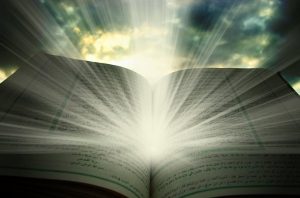No Islam without Knowledge
Islam consists, firstly, of knowledge and, secondly, of putting that knowledge into practice. A man can be white and have no knowledge; because he is born white he will remain so. Similarly, an Englishman will remain an Englishman though he may have no knowledge, because he has been born an Englishman. But no man becomes truly a Muslim without knowing the meaning of Islam, because he becomes a Muslim not through birth but through knowledge.
Unless you come to know the basic and necessary teachings of the Prophet Muhammad (blessings and peace be on him) how can you believe in him, have faith in him, and how can you act according to what he taught? And if you do not have faith in him, knowingly and consciously, as fully as you can, how can you become true Muslims?
Clearly it is impossible to become a Muslim and remain a ‘Muslim in a state of ignorance. Being born in Muslim homes, bearing Muslim names, dressing like Muslims and calling yourselves Muslims is not enough to make you Muslims; true Muslims know what Islam stands for and believe in it with full consciousness.
The real difference between a kafir (who does not accept God’s guidance and is ungrateful to Him) and a Muslim is not that of a name, that one is called Smith or Ram La and the other `Abdullah. No one is a kafir or a Muslim simply because of his name. Nor does the real difference lie in the fact that one wears a necktie and the other a turban.

Why can you not spend even a tenth part of your time and energy on things which are necessary to protect your iman?
The real difference is that of knowledge. A kafir does not understand God’s relationship to him and his relationship to God. As he does not know the will of God he cannot know the right path to follow in his life. If a Muslim, too, grows up ignorant of God’s will, what ground can there be to continue calling him a Muslim rather than a kafir?
Dangers of Ignorance
Listen carefully, brothers, to the point I am making. It is essential to understand that to remain in possession of, or to be deprived of, the greatest gift of Allah – for which you are so overwhelmed with gratitude – depends primarily on knowledge.
Without knowledge, you cannot truly receive His gift of Islam. If your knowledge is so little that you receive only a small portion of it, then you will constantly run the risk of losing even that part of the magnificent gift which you have received unless you remain vigilant in your fight against ignorance.
A person who is totally unaware of the difference between Islam and kufr (rejection of God’s guidance and ingratitude) and the incongruity between Islam and shirk (taking gods besides God) is like someone walking along a track in complete darkness. Most likely his steps will wander aside or on to another path without him being aware of what is happening.
Maybe he will be deceived by the sweet words of the Devil, ‘You have lost your way in the darkness. Come, let me lead you to your destination.’ The poor traveler, not being able to see with his own eyes which is the right path, will grasp the Devil’s hand and be led astray. He faces these dangers because he himself does not possess any light and is therefore unable to observe the road signs. If he had light, he would neither lose his way nor be led astray.
This example shows that your greatest danger lies in your ignorance of Islamic teachings and in your unawareness of what the Qur’an teaches and what guidance has been given by the Prophet, blessings and peace be on him. But if you are blessed with the light of knowledge you will be able to see plainly the clear path of Islam at every step of your lives. You will also be able to identify and avoid the false paths of kufr, shirk and immorality which may cross it. And, whenever a false guide meets you on the way, a few words with him will quickly establish that he is not a guide who should be followed.
Acquire Knowledge
Brothers! On this knowledge, whose absolute necessity I stress once again, depends whether you and your children are true Muslims and remain true Muslims. It is therefore hardly a trivial matter to be neglected. You do not neglect cultivating your land, irrigating and protecting your crops, supplying fodder to your cattle or doing whatever else is essential to the well-being of your trades and professions. Because you know that if you do you will starve to death and so lose the precious gift of life. Why then should you be negligent in acquiring that knowledge on which depends whether you become
Muslims and remain Muslims? Does such negligence not entail the danger of losing an even more precious gift – your iman (faith)? Is not iman more precious than life itself? Most of your time and labour is spent on things which sustain your physical existence in this life.
Why can you not spend even a tenth part of your time and energy on things which are necessary to protect your iman, which only can sustain your being in the present life and in the life to come?
I am not asking you to become scholars, read voluminous books or spend a large part of your lives in the pursuit of knowledge. It is not necessary to study so extensively to become a Muslim. I only want each one of you to spend about one hour of the twenty-four hours of the day and night in acquiring the knowledge of his Din, the way of life, the Islam.
Every one of you, young or old, man or woman, should at least acquire sufficient knowledge to enable him to understand the essence of the teachings of the Qur’an and the purpose for which it has been sent down.
You should also be able to understand clearly the mission which the Prophet, blessings and peace be on him, came into this world to fulfil. You should also recognize the corrupt order and system which he came to destroy. You should acquaint yourselves, too, with the way of life which Allah has ordained for Muslims.
No great amount of time is required to acquire this simple knowledge. If you value iman, it cannot be too difficult to find one hour every day to devote to this.
_________________________
The article is an excerpt from Abul A`la Al-Mawdudi’s book “Let Us Be Muslims”.
[ica_orginalurl]








